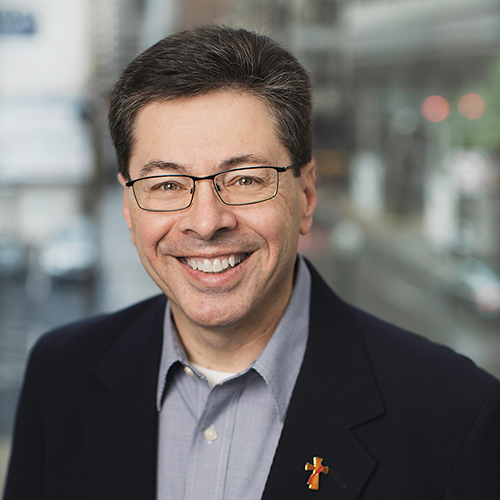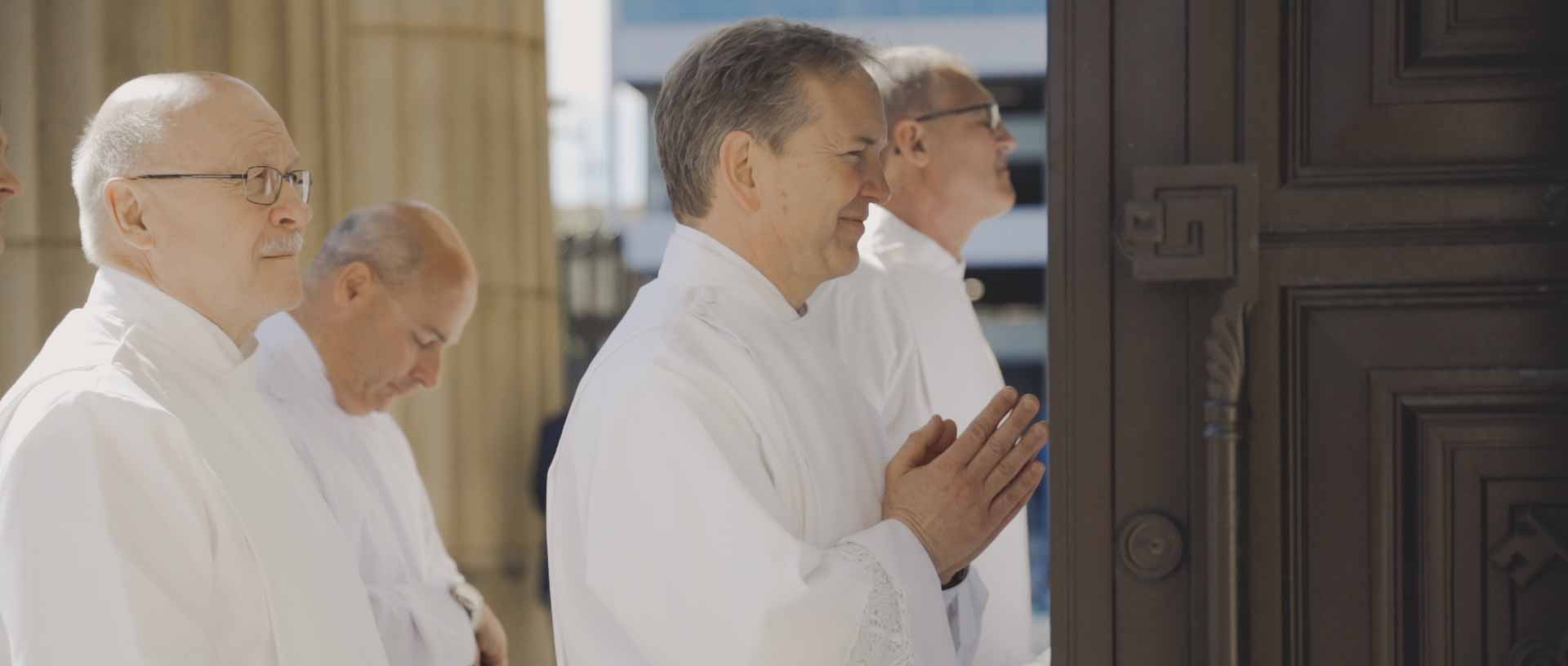Permanent Diaconate
Mission
The Office of the Diaconate provides general catechesis and information on the vocation of the deacon. It conducts the selection and admission process for applicants to diaconate formation and provides, through the Athenaeum of Ohio, a diaconate formation program for the archdiocese. The Office encourages spiritual, intellectual, personal, ministerial and communal growth among deacons and serves as a resource for placement and other personnel concerns of diocesan deacons.
FAQ's
Deacons are best described by who they are rather than by what they do. Men who are ordained to the diaconate promise to live out the charism of service to God’s people through the Word, Liturgy and Charity for the rest of their lives. The role of the deacon is to be a helper of the bishops and priests and to proclaim by his life the Church’s call to serve the needs of others. The deacon is the animator and promoter of what the community of faith must be: a community of service.
- Emotional maturity
- Personal integrity/appropriate self-knowledge
- Christian holiness/an active prayer life
- Generosity for service already being demonstrated
- Good physical & psychological health
- Ability to work in a team/work well with people
- Good communication skills (both as a speaker and as a listener)
- Ability to speak publicly and proclaim the Gospel effectively
- Need in the community for his service and leadership
- Acceptance by the Catholic community as evidenced by his ministry in the parish
- Be a resident of the Archdiocese of Cincinnati and a Catholic male in good standing in the Catholic Church and fully initiated in the faith and. If a neophyte, must have lived the faith for three years prior to application.
- Be at least 35 but not more than 69 years of age at the time of ordination.
- May be either single or married. If single at the time of ordination the candidate will make a promise to remain celibate for the rest of his life. If married the applicant must have been married for at least 5 years prior to application, must be able to give evidence of being in a stable and growing marriage relationship, and his wife must be willing to support her husband actively throughout formation and ordained ministry;
- If divorced and remarried, have obtained a declaration of nullity or a canonical dissolution of the prior marriage. If more than one declaration of nullity (including lack of form cases) or canonical dissolution of the marriage is needed (for husband & wife), the man may not be considered for the diaconate. If a man marries civilly prior to having obtained a declaration of nullity or a canonical dissolution of the prior marriage, he may not be considered for the diaconate.
- Never have procured or helped another person procure an effective abortion.
- Never have undergone an effective vasectomy nor will the applicant’s wife have undergone an effective tubal ligation.
- Never have been involved in any activity that would be unbecoming to the clerical state or that would bring scandal to the Church.
- Be keeping the needs of his family as a priority;
- Be at least a high school graduate and be able to complete the academic requirements of the formation program;
- Be physically, psychologically and emotionally sound;
- Have demonstrated ability and a willingness to minister to the needs of fellow parishioners and to the wider community;
- Have completed the two year Aspirancy program and the requirements for (at minimum) a Certificate in Pastoral Ministry from Mount St. Mary’s Seminary and School of Theology (or its equivalent);
- Be endorsed by his pastor as a worthy candidate for Holy Orders.
The Lay Ecclesial Ministry Program and the Deacon Formation Program are two separate programs. One of the application requirements for deacon formation is a certain level of theological and ministerial education. In the Archdiocese of Cincinnati this education is most easily obtained through the LEMP program, but there are other schools which provide the required education as well. Therefore, men in the Lay Ecclesial Ministry Program are not taking classes in preparation for entry into the Deacon Formation Program but to prepare themselves to minister whether they are called to the diaconate or not.
Preparation for ordination as a Permanent Deacon in the Archdiocese of Cincinnati is a five-year process. It consists of a two-year Aspirancy period, followed by a three-year Deacon Formation Program. A new cohort begins every three years. The schedule for both programs is below:
Aspirancy Program
A two-year program of discernment and preparation that is completed before applying for the Deacon Formation Program.
2026-2028 Cohort
Year 1: Aug, 2026 – May, 2027
Year 2: Aug, 2027 – May, 2028
Applications for this cohort must be submitted no later than June 30, 2026
Year 1: Aug, 2029 – May, 2030
Year 2: Aug, 2030 – May, 2031
Applications for this cohort must be submitted no later than June 30, 2029
2032-2034 Cohort
Year 1: Aug, 2032 – May, 2033
Year 2: Aug, 2033 – May, 2034
Applications for this cohort must be submitted no later than June 30, 2032
Deacon Formation (Candidacy) Program
A three-year intensive formation program preparing a man for ordination as a Permanent Deacon in the Archdiocese of Cincinnati.
2025-2028 Cohort
Year 1: Aug, 2025 – May, 2026
Year 2: Aug, 2026 – May, 2027
Year 3: Aug, 2027 – Apr, 2028 (Ordination)
Application period will open May 1, 2024 and will close April 30, 2025
Year 1: Aug, 2028 – May, 2029
Year 2: Aug, 2029 – May, 2030
Year 3: Aug, 2030 – Apr, 2031 (Ordination)
Application period will open May 1, 2027 and will close April 30, 2028
2031-2034 Cohort
Year 1: Aug, 2031 – May, 2032
Year 2: Aug, 2032 – May, 2033
Year 3: Aug, 2033 – Apr, 2034 (Ordination)
Application period will open May 1, 2030 and will close April 30, 2031
The Aspirancy Program must be completed (along with the academic requirements) before a man can enter the Deacon Formation Program.
If you are considering applying for Aspirancy and Deacon Formation, you must contact the Director of the Office of the Diaconate at (513) 263-6641. Please contact the Director very early in your discernment to ensure that you are on the right path for completing the pre-requisites for the Deacon Formation Program.
Selection includes the receipt of all questionnaires, sacramental certificates, transcripts, medical record, and an autobiography of personal and ministerial history. Questionnaires are completed by the applicant, his wife (if married), his pastor, and five personal references. Each applicant participates in a psychological assessment by a psychologist. An in-home visit and extended interview with the applicant (and wife if married) is conducted by the Director of the Office of the Diaconate. All this information is then evaluated by a team (both clergy and lay) and letters indicating whether a person has been accepted or not are then mailed.
A deacon is called by the Archbishop, not the local parish community. Though a man is normally assigned to his home family of parishes by the Archbishop, at the Archbishop’s discretion he may be asked to serve somewhere else in the archdiocese where there is need for his ministry. Therefore, the question in the selection process is whether or not the archdiocese, in the person of the Archbishop, is calling a man to the permanent diaconate.
The Archbishop entrusts the Diaconate Office and the Director of Permanent Deacon Formation with the responsibility of discerning whether a man has the appropriate motives, abilities, attitude and personality traits which are called for by Canon Law and the Guidelines of the United States Conference of Catholic Bishops for permanent deacons.
No. Like the Seminary Formation Program, the Deacon Formation Program constitutes one more period of discernment. The candidate may find, as he learns more about himself and the diaconate, that ordained ministry is not his calling. Periodic evaluation of each man by his pastor and teachers in addition to regular self-evaluation allow the formation staff to assist each individual in his vocation journey. These may result in either the candidate or the formation staff suggesting that the formation relationship be terminated.
Once a man is accepted into the Deacon Formation Program there are three additional years of preparation for ordination. The formation for diaconate is not only academic but also spiritual and ministerial. A man in deacon formation meets with a spiritual director. He and his wife also have the opportunity to meet with a deacon mentor and his wife.
Candidates are installed as lector and acolyte during the formation program. For each installation the candidates carry out ministerial projects in their parish correlating to the Word, Liturgy and Charity.
The most important thing a man in formation can do is to keep in conversation with his pastor and/or parish staff. The man needs to elicit honest feedback on his ministry. The candidate needs to be challenged to grow, to become accustomed to doing both self-evaluation and engaging in evaluation in the context of a ministry team or parish staff. Because he is geographically close to his parish, this is the best arena for the man in formation to try out different ministries, to continue to empower other parishioners to respond to needs for service in the community, and to sharpen his team ministry skills.
In the Archdiocese of Cincinnati a Deacon is only granted faculties to preach on weekdays and at funerals, weddings and baptisms. He may apply for permission to preach on Sundays after at least one year of ordination and successful completion of the required post-ordination courses, and the final approval of the Archbishop and his pastor.
Office of the Diaconate
Archdiocese of Cincinnati
100 East Eighth Street
Cincinnati, Ohio 45202
(513) 263-6641
Resources
Contact Us
- Phone: (513) 263-6641
- Fax: (513) 421-6225
General Inquiries
Staff Directory


